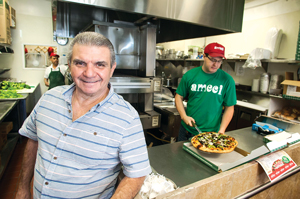
California franchisers dodged a bullet late last month when the state’s high court issued a narrow 4-3 decision limiting the instances in which they could be named in suits brought by employees against a franchisee.
Had the court ruled the other way in the closely watched case, it could have turned the business of franchising on its head in California, said Bobby Williams, vice president of marketing for Torrance Japanese restaurant chain Yoshinoya America Inc., one of the largest Los Angeles County-headquartered franchise operators.
A contrary ruling could have forced franchisers to take full control over daily operations of their California franchisees, he said, and nearly every franchiser would refuse to enter new franchise agreements for fear they would potentially be liable for complaints brought against their franchisees.
“Why would you want to have a franchisee then?” Williams said. “I can say without any hesitation, there would be a chilling effect on store development.”
Nick Andrisano, who took a slice of the L.A. pizza market 30 years ago when he opened his Ameci Pizza & Pasta restaurant and now has 36 franchise agreements with operators from Manhattan Beach to the San Fernando Valley, said that his agreements make clear that his Canoga Park-based business is not liable for the actions of the franchisee.
“If an employee of a franchisee hurts somebody in a driving accident, I don’t know how a franchiser could be held responsible,” Andrisano said. “The franchisee is responsible.”
While it might seem like an obvious decision to L.A. franchisers, the California Supreme Court’s ruling did not come easily or without a five-year legal battle.
Split decision
The case began in June 2009, when Taylor Patterson, a former Domino’s Pizza franchise employee in Southern California, accused her former manager of sexual harassment. She filed a complaint against the supervisor as well as the Domino’s franchisee and franchiser.
The giant pizza chain immediately opposed the claim, saying a franchiser should not be held liable for the actions of employees working for its franchisee because it runs a separate business and isn’t responsible for the day-to-day operations of its franchisees.
The trial court sided with Domino’s, while an appellate court ruled in favor of Patterson. Domino’s then hired Mary-Christine Sungaila, an appellate partner in the downtown L.A. office of Snell & Wilmer, to represent the chain at the state Supreme Court in its June hearing of the case.
On Aug. 28, the court found in favor of franchisers, its narrow ruling confirming franchisers are not to automatically be held liable for the actions of its franchisees’ employees. The decision also established a more specific test to determine if a franchiser could be held liable in other disputes. Put simply, Sungaila said, whoever is in charge of running day-to-day operations is responsible.
“That’s a pretty important standard to be clarified in the state of California, which has quite a few franchise businesses,” she said.
Franchisers remain exposed to such suits if they retain any level of control over some duties, including hiring and firing employees.
Attorney Anthony Oncidi, a partner in Proskauer’s L.A. office who was not directly involved in the case, said “franchisers should breathe a sigh of relief,” but also sounded a note of caution.
He said franchisers should take note of how close Domino’s came to facing trial.
“No parent company or entity or franchiser should think that the Domino’s case represents a get-out-of-jail-free card. In fact, it’s the contrary to that,” he said. “If they are directly involved with employment decisions of their franchisees, the franchiser could be found to be an employer as well.”
In addition, the court’s decision likely won’t put a stop to future litigation against franchisers. Oncidi predicts that disgruntled employees and their counsel will likely be armed with strong arguments about how their case is different from the Domino’s litigation.
“It’s a very common occurrence for plaintiffs in these types of cases to be extremely aggressive in who they name as defendants,” he said. “They include as many potentially deep pockets as they can.”
